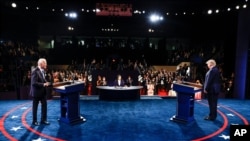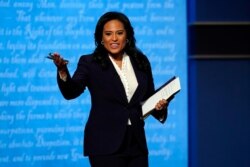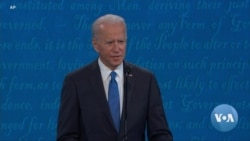When debate moderator Kristen Welker posed her questions to President Donald Trump and former Vice President Joe Biden, she ended by saying “You have two minutes uninterrupted.”
The introduction of a mute to the candidates’ microphones put an emphasis on the word “uninterrupted.”
It was added to Thursday’s debate by the non-partisan Commission on Presidential Debates and agreed to by the candidates to prevent a replay of the interruptive first debate in September.
It was the first major change to the presidential debates since the introduction of the town hall debate format in 1992.
What else can be done?
Case Study
One idea is to conduct a case study, “a kind of dream format” that involves teamwork.
“You just sort of lay out of situations typical of what a president might face,” explains Alan Schroeder, journalism professor at Northeastern University.
“I mean, you wouldn't use a real country by name, but you could come up with a scenario here and make them react in real time and see how that goes. Or maybe where you bring in an adviser to work with the candidates so that you see how they collaborate,” he added.
“The debate would start with: Here's the issue or the situation. You have 30 minutes or whatever it is to meet with your consultants and advisers and then we want you to come back with a position,” suggests John Koch, director of debate at Vanderbilt University.
Koch said a case study debate helps voters “because what we really want out of a president is somebody who can, in a crisis or when an issue presents itself, meet with their consultants or advisers, make a decision and then be able to defend it.”
“We know a president doesn't operate typically in isolation," says Schroeder. “So, it might be kind of interesting to see, how do they do in a group setting where they have to improvise.”
Medium, Mute and Moderators
Mary Kate Cary, a senior fellow at the University of Virginia’s Miller Center, echoed a suggestion from Twitter users for a free-flowing conversation on the popular Joe Rogan podcast.
“No audience, just the three of them," she said. "Four hours. And let Joe Rogan get them talking and see how they stand up.”
The mute button was used only for initial two-minute responses to questions. But when the candidates responded to each other freely, there is an argument to make that a referee is needed along with the moderator.
"As a moderator, your job is to think about questions and follow-up questions that really get at the best information from the candidates,” said Karrin Vasby Anderson, professor of communications studies at Colorado State University.
“If you ask a question and they don't answer it, you should ask it again until they answer it," Vasby Anderson said. "That is the moderator's job, and it's very hard to do that job if you're also parsing how many minutes people are speaking or whose turn it is.”
She said the city council in Fort Collins, Colorado, where she lives, uses a timer and alarm to provide an “impartial technological device” for debates.
Impediments to Change
The Commission on Presidential Debates has four years to consider different formats.
But how much can really change?
"The obstacle has always been the participants,” said Schroeder of Northeastern University, who authored a book on the history of presidential debates. “They don't want to do anything that makes an already risky situation that much riskier.”
“Our research shows that voters point to the debates as the most trusted source of communication,” said Mitchell McKinney, communication professor and director of the Political Communication Institute at the University of Missouri.
“I think that they feel like that in this moment where candidates — again, no teleprompter, notes, no aides — that it's the real candidate that they're getting," McKinney noted.
"So, you know, beyond all of that we could try all sorts of things to make the interactions more effective. But that's not to ensure that the candidates are going to play along.”







